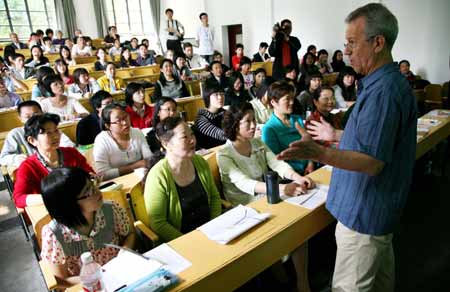I was very lucky this weekend to be told of a limited deal on an online TEFL course. This deal cut the price down by 82%, so instead of spending roughly R5000 on a course, I spent only R750. The offer pops up from time to time on Groupon so it's worth checking once in a while.
If I have a PGCE, do I need a TEFL for South Korea?
Technically, if you have already got a PGCE (graduated, certificate and all), then you're immediately bumped up to the second pay level. So no, you don't need a TEFL course to get the job. However, my method lecturer, C, explained to us that TEFL is a brand. It's a specific way of teaching. So if you want your students to have continuity throughout their schooling despite having a new Foreign Teacher every year, it's probably in your interest to be familiar with the system that they are used to.
I'm about to complete the first unit of the course, which is on Classroom Management and Professional English. And so far I have learned a lot that I didn't necessarily learn in PGCE. There are activities suggested that I would not necessarily have thought of, and certain basic principles with regard to using the board and giving instructions that were suggested in PGCE but which are more structured and clear in the TEFL course.
For example, after completing the English First Additional Language method course, I was of the opinion that rephrasing instructions and repeating them frequently would contribute better to learners' understanding. On the contrary, TEFL suggests using simple, clear instructions and demonstrations, and then asking targeted questions to see if everyone knows what's going on. And now that I think of it, this did come up in our class discussion during PGCE, but was not heavily emphasised. But it makes a lot of sense not to overwhelm learners with a tidal wave of multiply-phrased foreign language. Looking back on my last TP, it might explain why there was often a lot of misunderstanding with the younger grades about what they were supposed to do, especially with regards to homework.
 |
| The only acceptable excuse. |
Another element is that the PGCE EFL method is aimed at the South African curriculum for Additional Language, which is quite different from Foreign language. In Additional Language, the learners are often fluent enough to speak and understand (albeit with poor grammar and limited vocab) as a result of living in a society where the L2 is used. Foreign language has an emphasis on the foreign. So often you'd be teaching learners who have no background experience of the L2, and can barely understand it. In that aspect, TEFL definitely prepares you better for teaching English overseas, such as in South Korea or Japan.
 |
| So kids, how many words of English do you know? |
Online or Real Life?
I contacted a language school in Cape Town who have been known to come through to our little town each year, and they plan to come from 29th September – 8 October. It is definitely worth doing a course like this in person because you can get some practise with the theory and some depth to your knowledge through class discussion. It is also definitely a better idea if you have no PGCE at all, and no teaching experience at all, to do this in person as you then get some experience before having to teach your first class to a bunch of blank faces.
 |
| Little do they know, this is Bob's first lesson. |
That said, I decided to go with the super-cheap deal on the online course as I
a) already have teaching experience
b) wanted to save myself R4000+
c) know of several people in my town who are doing the same course, so hopefully we'll be able to meet up and do the group activities together, and all those other shiny things.
So in the end it depends on your needs and experience.
Can TEFL help my PGCE?
I think it's interesting to see an approach to teaching that is slightly different to what I've been taught, and also to get ideas and source material for lessons to teach in the future. If you are teaching in a school where they don't speak the same language as you, such as in a township school or an Afrikaans school, it is definitely something useful in terms of making sure the kids know exactly what's going on. So at this stage, yes, I think it can be an enriching addition to a PGCE. But the PGCE is quite sufficient if you want to stay in SA and teach the SA curriculum; if money is an issue and you don't plan to be a travelling teacher, then I would suggest you save your money (unless you can get an awesome deal like the Groupon one). Again, it depends on your needs and intentions for the future.
I guess I was raised to think "the more qualifications, the more appealing your CV" but I have since been told that when hiring teachers at a school, often the prospective teacher's extra mural activities can be more of a deciding factor than how many certificates line their walls. If you're an awesome soccer coach, a brilliant artist, musician or dramatist, then those will impress the school more than having another acronym attached to your name. I personally enjoy learning about education, and the different methods and theories out there. So while TEFL will help me get into Korea, and may help my long TP at an Afrikaans school, I think I'm also doing this for interest's sake.
 |
| Learn ALL the things! |
Once again, it comes down to your individual qualifications, future plans and needs. So it's up to you.


No comments:
Post a Comment